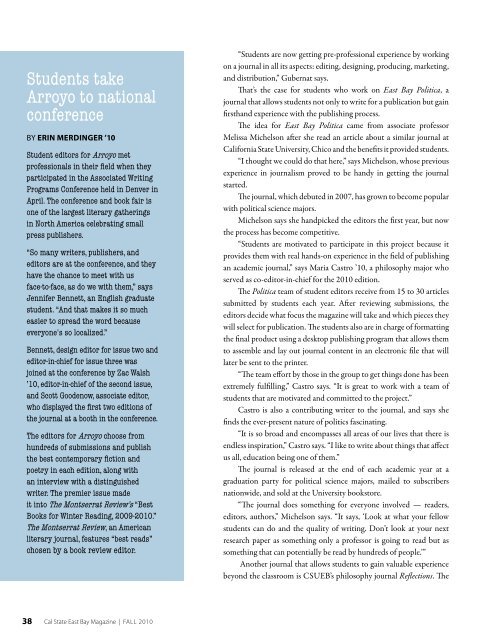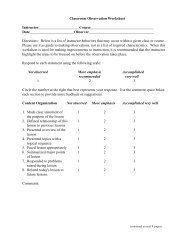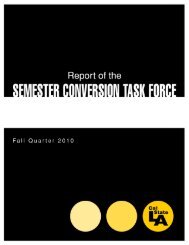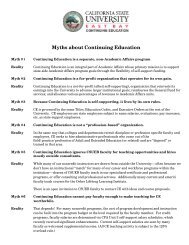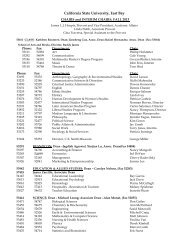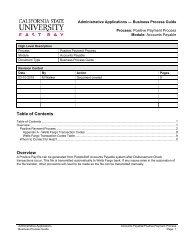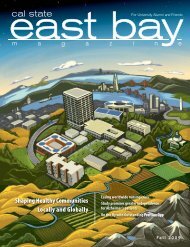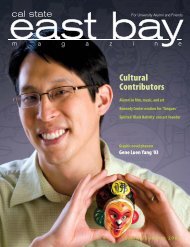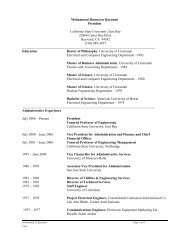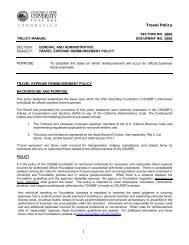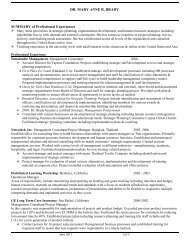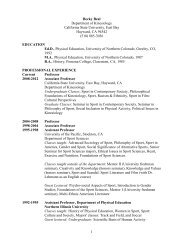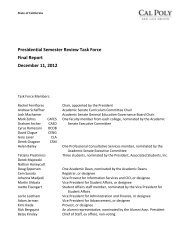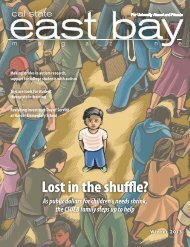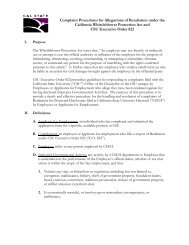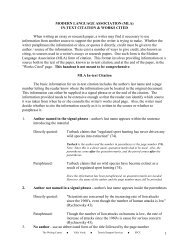Fall 2010 - California State University, East Bay
Fall 2010 - California State University, East Bay
Fall 2010 - California State University, East Bay
You also want an ePaper? Increase the reach of your titles
YUMPU automatically turns print PDFs into web optimized ePapers that Google loves.
Students take<br />
Arroyo to national<br />
conference<br />
By erin merdinger ’10<br />
Student editors for Arroyo met<br />
professionals in their field when they<br />
participated in the Associated Writing<br />
Programs Conference held in Denver in<br />
April. The conference and book fair is<br />
one of the largest literary gatherings<br />
in North America celebrating small<br />
press publishers.<br />
“So many writers, publishers, and<br />
editors are at the conference, and they<br />
have the chance to meet with us<br />
face-to-face, as do we with them,” says<br />
Jennifer Bennett, an English graduate<br />
student. “And that makes it so much<br />
easier to spread the word because<br />
everyone's so localized.”<br />
Bennett, design editor for issue two and<br />
editor-in-chief for issue three was<br />
joined at the conference by Zac Walsh<br />
’10, editor-in-chief of the second issue,<br />
and Scott Goodenow, associate editor,<br />
who displayed the first two editions of<br />
the journal at a booth in the conference.<br />
The editors for Arroyo choose from<br />
hundreds of submissions and publish<br />
the best contemporary fiction and<br />
poetry in each edition, along with<br />
an interview with a distinguished<br />
writer. The premier issue made<br />
it into The Montserrat Review’s “Best<br />
Books for Winter Reading, 2009-<strong>2010</strong>.”<br />
The Montserrat Review, an American<br />
literary journal, features “best reads”<br />
chosen by a book review editor.<br />
“Students are now getting pre-professional experience by working<br />
on a journal in all its aspects: editing, designing, producing, marketing,<br />
and distribution,” Gubernat says.<br />
That’s the case for students who work on <strong>East</strong> <strong>Bay</strong> Politica, a<br />
journal that allows students not only to write for a publication but gain<br />
firsthand experience with the publishing process.<br />
The idea for <strong>East</strong> <strong>Bay</strong> Politica came from associate professor<br />
Melissa Michelson after she read an article about a similar journal at<br />
<strong>California</strong> <strong>State</strong> <strong>University</strong>, Chico and the benefits it provided students.<br />
“I thought we could do that here,” says Michelson, whose previous<br />
experience in journalism proved to be handy in getting the journal<br />
started.<br />
The journal, which debuted in 2007, has grown to become popular<br />
with political science majors.<br />
Michelson says she handpicked the editors the first year, but now<br />
the process has become competitive.<br />
“Students are motivated to participate in this project because it<br />
provides them with real hands-on experience in the field of publishing<br />
an academic journal,” says Maria Castro ’10, a philosophy major who<br />
served as co-editor-in-chief for the <strong>2010</strong> edition.<br />
The Politica team of student editors receive from 15 to 30 articles<br />
submitted by students each year. After reviewing submissions, the<br />
editors decide what focus the magazine will take and which pieces they<br />
will select for publication. The students also are in charge of formatting<br />
the final product using a desktop publishing program that allows them<br />
to assemble and lay out journal content in an electronic file that will<br />
later be sent to the printer.<br />
“The team effort by those in the group to get things done has been<br />
extremely fulfilling,” Castro says. “It is great to work with a team of<br />
students that are motivated and committed to the project.”<br />
Castro is also a contributing writer to the journal, and says she<br />
finds the ever-present nature of politics fascinating.<br />
“It is so broad and encompasses all areas of our lives that there is<br />
endless inspiration,” Castro says. “I like to write about things that affect<br />
us all, education being one of them.”<br />
The journal is released at the end of each academic year at a<br />
graduation party for political science majors, mailed to subscribers<br />
nationwide, and sold at the <strong>University</strong> bookstore.<br />
“The journal does something for everyone involved — readers,<br />
editors, authors,” Michelson says. “It says, ‘Look at what your fellow<br />
students can do and the quality of writing. Don’t look at your next<br />
research paper as something only a professor is going to read but as<br />
something that can potentially be read by hundreds of people.’”<br />
Another journal that allows students to gain valuable experience<br />
beyond the classroom is CSUEB’s philosophy journal Reflections. The<br />
journal features undergraduate and graduate students’ work and is available online through the philosophy department’s Web<br />
site, http://class.csueastbay.edu/philosophy/, allowing easy access to readers. Faculty advisor Jennifer Eagan has overseen the<br />
electronic version of the publication since she joined the <strong>University</strong> in 2004.<br />
“The objective is to promote all the good work students are doing in philosophy,” says Eagan, associate professor and<br />
department chair of philosophy. “(Faculty) have a drive to really highlight our students’ work.”<br />
One submission Eagan received from a then-philosophy undergrad for the spring <strong>2010</strong> edition particularly impressed her.<br />
In the pop philosophy article, author Ryvenna Lewis ’10 examines ethics in fiction. Lewis says pop philosophy, a personal<br />
passion for her, discusses philosophical values and ideas as presented in popular books, movies, and television.<br />
Her paper titled “Watchmen and Utilitarianism,” looks at a common<br />
approach to ethics called utilitarianism — a theory that suggests action<br />
should be directed toward achieving the greatest happiness for the greatest<br />
number of people — and criticizes it using examples from the comicbook-turned-movie<br />
“Watchmen.”<br />
“It brings philosophical conversations to a level that anyone can understand,<br />
using examples and ideas that many people may already be familiar<br />
with and interested in,” Lewis says. “It’s also a lot more fun to write!”<br />
In her piece, Lewis writes: “In<br />
utilitarianism, we are taught that almost<br />
anything can be good as long as it produces<br />
more happiness than suffering. Any action<br />
taken, despite the motivation behind it,<br />
can be good as long as it follows this<br />
guideline. But can we live by this kind of<br />
principle I say that we can’t. Utilitarianism<br />
is deeply flawed because of three important<br />
factors: it ignores motivation/intention, it<br />
Academic journals, including<br />
Reflections, above, give Cal <strong>State</strong><br />
<strong>East</strong> <strong>Bay</strong> students an opportunity<br />
to publish original work and gain<br />
editing experience.<br />
demands prescience from we who have<br />
none, and it can lead to shocking human<br />
rights violations.”<br />
Eagan picks a new handful of<br />
students each year to serve as editors who<br />
help with editing, proofreading, and publishing the journal from start<br />
to finish.<br />
Faculty advisors who oversee student-produced journals view the experience<br />
as more than another bullet point for students to add to<br />
their resumes.<br />
“It enables students to see that writing is not a mere classroom<br />
exercise (or) another paper or poem or story on the way to a degree,”<br />
Gubernat says. “Rather, publishing a magazine like Arroyo gets students<br />
actively engaged in the literary community of our time — one that is<br />
diverse, exciting, full of the possibilities of discovering new talent as well<br />
as rubbing shoulders with some of the more established writers.” n<br />
Poets ply their<br />
charms in<br />
Occam’s Razor<br />
By erin merdinger ’10<br />
The Department of<br />
English at Cal <strong>State</strong><br />
<strong>East</strong> <strong>Bay</strong> also<br />
produces Occam’s<br />
Razor, an annual<br />
journal featuring<br />
fiction and poetry by<br />
CSUEB students.<br />
Each year a small group of students is<br />
chosen to help judge approximately 200<br />
poetry submissions and determine<br />
which pieces to publish.<br />
Most of the work submitted comes from<br />
creative writing classes at CSUEB, says<br />
Donald Markos, an emeritus professor in<br />
English who has put together the journal<br />
since its first edition in 1989.<br />
“We look for writing that is fresh, free of<br />
cliché, imaginative, and illuminates some<br />
aspect of life,” Markos says.<br />
Copies of Occam’s Razor are available<br />
in the Department of English and<br />
are often used as supplementary<br />
material in creative writing classes or<br />
introduction to literature courses at<br />
Cal <strong>State</strong> <strong>East</strong> <strong>Bay</strong>.<br />
students<br />
38 Cal <strong>State</strong> <strong>East</strong> <strong>Bay</strong> Magazine | FALL <strong>2010</strong> Cal <strong>State</strong> <strong>East</strong> <strong>Bay</strong> Magazine | FALL <strong>2010</strong> 39


